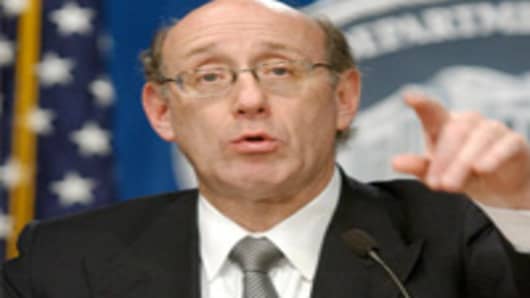Ken Feinberg is no stranger to uncomfortable situations. After Sept. 11, he spent nearly three years working on compensation for victims and families. He was dubbed the "Pay Czar" during the financial crisis, charged with determining executive compensation for firms that received federal bailout money.
Then, there's BP Oil Spill Fund, also known as the Gulf Coast Claims Facility (GCCF).
The mission since the spring of 2010: Establish a protocol for judging the value, credibility and worthiness of individuals and businesses hurt by the largest spill in U.S. history.
The fund had its proponents and detractors, but it did give out over $6 billion before a single court case came to trial.
Recently, when a legal settlement was reached in court to deal with the next phase of compensation, Feinberg decided to step aside.
"The job was done," he told CNBC. "I served as the administrator of the fund for 18 months, paid out $6.5 billion to 220,000 people.
"When the litigation was settled, the whole auspices of compensation now shifts to the federal court in New Orleans — a perfect time for me to pass the baton to the federal judge who is now overseeing the program."
When comparing the last two years with BP to the 20-plus years after Exxon Valdez, Feinberg points out that the Valdez case is STILL in court. He admits, there are some on the Gulf Coast who are not happy with the GCCF, but billions were paid out, and thousands of people avoided lengthy court cases.
"I know of no precedent in American history when a company within weeks of a tragedy fronts $20 billlion and then announces it to the world," Feinberg said. "My job was to take the money and administer the process."
A recent independent audit reported that 7,300 claimants were underpaid. That's about three percent of the total pool.
But what's not in the pool of claimants who received ANY money: Adjacent businesses.
If a fishing town was decimated by the spill, fisherman were compensated, but most other businesses were not.
Take "The Flower Gallery" in New Orleans, the biggest flower and plants shop in southeastern Louisiana.
Kenny Rabalais tells CNBC that business slowed down to the point that he reduced hours and stopped hiring new workers. He submitted records showing that the time after the spill was the first dip in sales during their 22 years in business.
His $400,000 claim was initially rejected and since re-submitting, he hasn't even received a response.
"We didn't pay a florist or a dentist or a chirpractor or a vet because those claims were so far removed — indirect from the spill itself," Feinberg said.
Rabalais knows Feinberg's stance, and simply does not agree.
"They think businesses like mine that are note directly related are not affected," he said. "The hotel business was really affected.
Feinberg knows some are unhappy, but he firmly contends that his efforts were to be fair — and not to save BP money.
"There is always going to be criticism that you are unfair," he said. "What I have learned over the last 35 years, in all of these cases and not just BP, is that in good faith, victims do believe they should be paid ... that all of their damage is attributable to the tragedy.
"They honestly feel that whatever ill that happened to them is due to the spill."
And if they were in the right business and could document their losses, then Feinberg would pay them.
Simple as that.
"If you don't get what you want, you have other remedies," Feinberg said. "You can appeal. You can go to court."
Those who decided on the court route now have a choice. Accept the terms of the recent legal agreement, or go it alone. BP estimates that the next phase — the one moving forward without Feinberg — could cost close to $8 billion.
But that's not Feinberg's concern anymore. He's writing a book on the experience, and moving on with his life.
"You go into these assignments," he reflected, "whether it's BP, 9-11 or whatever, don't expect thanks. Don't expect praise.
"Criticism comes with the territory. Innocent people have been harmed ... and it's human nature: They expect total recovery."
Disclosure: Comcast owns 51 percent of CNBC,. General Electric owns 49 percent of CNBC.
Follow Brian Shactman on Twitter: @bshactman



